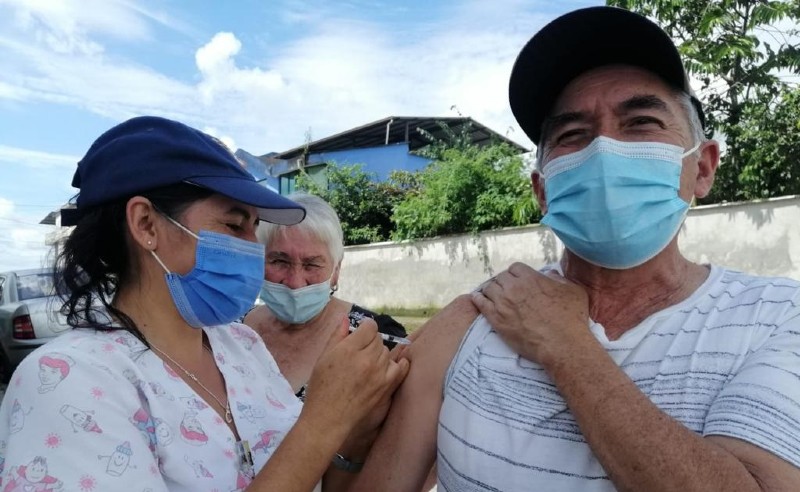In a short video released by his communication team, the president of the National Emergency Operations Committee (COE), Juan Zapata, updated the figures on the coronavirus pandemic in Ecuador.
“The data continues to be encouraging,” said Zapata, announcing that covid infections in February 2022 in Ecuador have fallen drastically.
By the end of January, when the peak caused by the Ómicron variant and the New Year’s Eve parties began to wane, there were 51,569 infections. A month later, the registered cases totaled 9,007 —a decrease of 82%, according to the figures given by Zapata in his intervention.
It’s a “very marked downward trend,” said Zapata, head of the agency that has become ubiquitous in the past two years.
Initially designed to attend to specific emergencies, the National COE, and its peers in each of the 221 municipalities of Ecuador, were activated in March 2020, when the health emergency was declared due to the arrival of covid-19 in the country.
Since then, the National COE has directly influenced the daily life of all of Ecuador. Its provisions marked the way in which the country circulated, traveled and even how public and private parties were celebrated.
As the pandemic has been losing strength—thanks to mass vaccination—the committee has ceased to have a dominant role. In mid-February, it removed its greatest tool, epidemiological traffic lights, which established contagion and occupancy ranges for hospitals and intensive care units (ICUs) to determine capacity and prohibitions in Ecuador.
Even so, the COE still meets weekly to analyze the figures of covid-19 in Ecuador. At the plenary meeting on March 2, 2022, the data that Zapata referred to as “encouraging” were presented. In addition to the drop in infections, the president of the COE announced that positive diagnoses also plummeted.
“The reduction in cases is marked in Quito and Guayaquil,” says medical researcher Esteban Ortiz, explaining that the rate of growth of infections has decreased almost to pre-Omicron levels.
“Definitely the epidemiological situation is extremely encouraging, but it is obvious because it responds to the logic of infected and recovered susceptibles – that is, there was such a level of contagion that after that peak, there is no one else to infect. That’s where the logic goes,” says Ortiz.
This decrease in cases should continue, says Ortiz.
“We are going to continue to have cases of covid-19, but not spikes that put the health system in trouble,” says Ortiz.
“That is the best scenario.”
The worst, he explains, would be for a new variant to appear that totally evades the immunity generated by the infection and the vaccines, and once again causes a saturation of hospitals.
“With Ómicron, we did not have the saturation that there was before, and hospital occupation is positive. So, we’re doing well on that side,” said Ortiz.
Positive antigen tests went from 62% of the total at the end of January to 13% at the end of February. In the same period, PCR tests that confirmed the contagion fell from 63% to 9%.
Also, ICU bed occupancy is at 50% and hospitalization bed occupancy is at 25% – an unthinkable number at the most severe peaks of the coronavirus pandemic, when the hospital system was overwhelmed and there was no way to even get a tank oxygen.
Despite the good news, Zapata asked for caution because of the epidemiological situation after the Carnival holiday, which ended on Tuesday, March 1, 2022.
PCR exemptions for Ecuadorians arriving from Ukraine
Zapata also announced that Ecuadorians who are being repatriated from the war zone in Ukraine, will be exempt from presenting a negative PCR diagnostic test done 72 hours prior to boarding the flight. Nor should they show they need to show a vaccination.
Both requirements remain mandatory to enter the country for all other passengers.
However, those arriving from Ukraine will have to take a PCR test upon arrival in Quito. If it is positive, they must keep mandatory isolation for ten days, during which they will be monitored by the Ministry of Public Health.
This is a humanitarian exception, said Zapata, which will be in force for the duration of the conflict in Ukraine and will benefit not only the evacuated Ecuadorians, but also the officials who are working in the war zone.


0 Comments